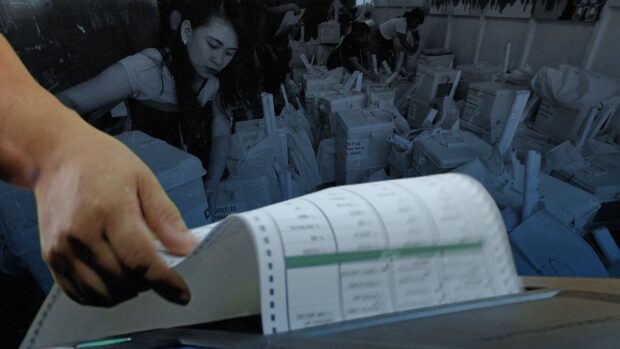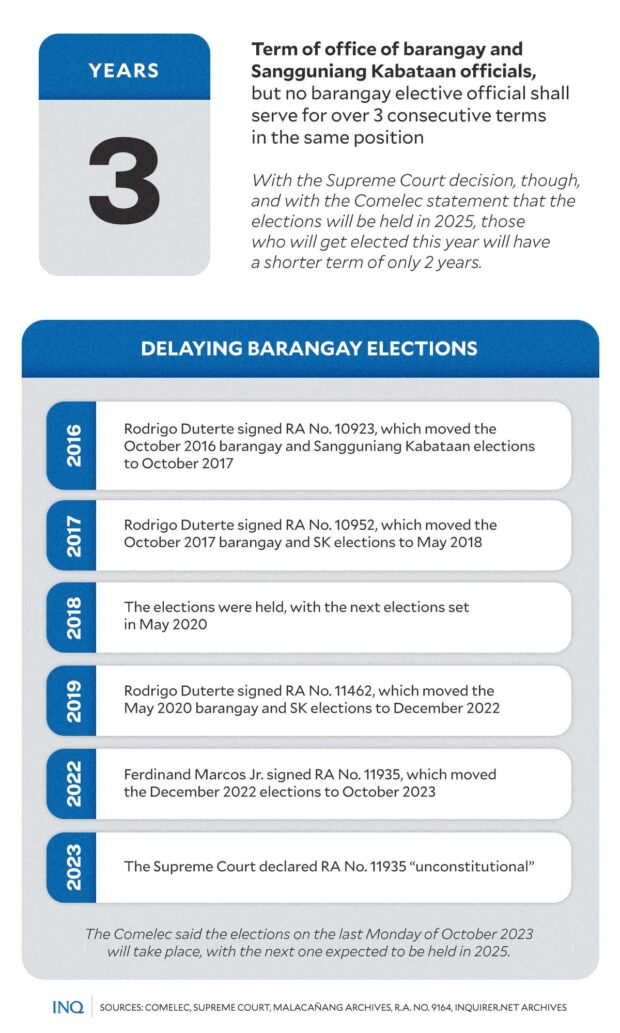
INQUIRER FILE PHOTO
MANILA, PHILIPPINES—With the decision of the Supreme Court (SC) that declared unconstitutional the law that rescheduled barangay and Sangguniang Kabataan (SK) elections, originally set for Dec. 5, 2022, to Oct. 30, 2023, the winners of the October elections will have a shorter term.
Last year, Republic Act (RA) No. 11935 was signed into law by President Ferdinand Marcos Jr., giving sitting barangay and SK officials almost a year of extended office, but the law was assailed at the SC.
The SC later declared that the free and meaningful exercise of the right to vote, as protected and guaranteed by the 1987 Constitution, required the conduct of “genuine periodic elections,” which should be held at intervals not excessively long.
The village and youth elections, as mandated by law, are supposed to happen every three years, but delays and postponements have resulted in officials holding office for up to five years.

GRAPHIC Ed Lustan
Since 2016, the grassroots elections have already been postponed four times—2016, through RA No. 10923; 2017, through RA No. 10952; 2019, through RA No. 11462; and 2022, through RA No. 11935.
The last barangay and SK elections were held in May 2018.
As the SC said, the succeeding barangay and SK elections after the one on Oct. 30, 2023 shall be held on the first Monday of December 2025 and every three years thereafter, pursuant to RA 11462.
There will still be an election on Oct. 30, 2023 as the SC “recognized the existence of RA 11935 as an operative fact which had consequences and effects that cannot be reversed nor ignored.”
2 years in office
But since there will be village and youth elections in 2025, new officials who will be elected this year will only have two years in office instead of three, which is mandated by law.
Maria Ela Atienza, a professor of political science at the University of the Philippines Diliman, said “if they win, they have a shorter period of time to make ordinances and implement programs they think are important.”
Likewise, she told INQUIRER.net via FB Messenger that “voters are deprived of a full term for barangay officials who they can interact with in the process of governance and policy-making.”
As provided by law, village and youth officials have a term of office of three years, but no barangay elective official shall serve for over three consecutive terms in the same position.
Proposed 5-year occupancy
Earlier this year, Cagayan de Oro Rep. Rufus Rodriguez filed House Bill No. 7123, which seeks to lengthen the term of office of barangay and SK officials to five years instead of only three years.
Rodriguez, chairman of the House Committee on Constitutional Amendments, said the five-year term “would ensure more stability in the barangay level and ensure that programs initiated by the current leaders would come to fruition.”
Back in the 18th Congress, Sen. Imee Marcos filed Senate Bill No. 1105, which also sought to extend the term of office of village and youth officials. The only difference was the proposal to extend it to six years.
She had stressed in the bill that barangays serve as the “primary planning and implementing unit of government policies, plans, programs, projects, and activities in the community.”
“They also provide a forum where the collective views of the people may be expressed, crystallized, and considered, and where disputes may be amicably settled,” the President’s sister said.
Violation of rights
As the SC stressed, RA No. 11935 violated the right to suffrage as it failed to satisfy the requisites of the substantive aspect of the due process clause of the 1987 Constitution.
The high court found that there was no legitimate government interest or objective to support the legislative measure, and that the law unconstitutionally exceeds the bounds of Congress’ power to legislate.
Looking back, one of the main reasons that barangay and SK elections had been postponed was to free up funds for the exercise to finance COVID-19 mitigation measures and help the economy rebound from the devastation of the pandemic.
The enactment of RA No. 11935 was attended with grave abuse of discretion amounting to lack or excess of jurisdiction, the SC said, stressing that postponement for the purpose of augmenting the Executive’s funds is violative of the 1987 Constitution.
This is because it “unconstitutionally transgresses the constitutional prohibition against any transfer of appropriations, and it unconstitutionally and arbitrarily overreaches the exercise of the rights of suffrage, liberty, and expression.”
Post Views: 862


